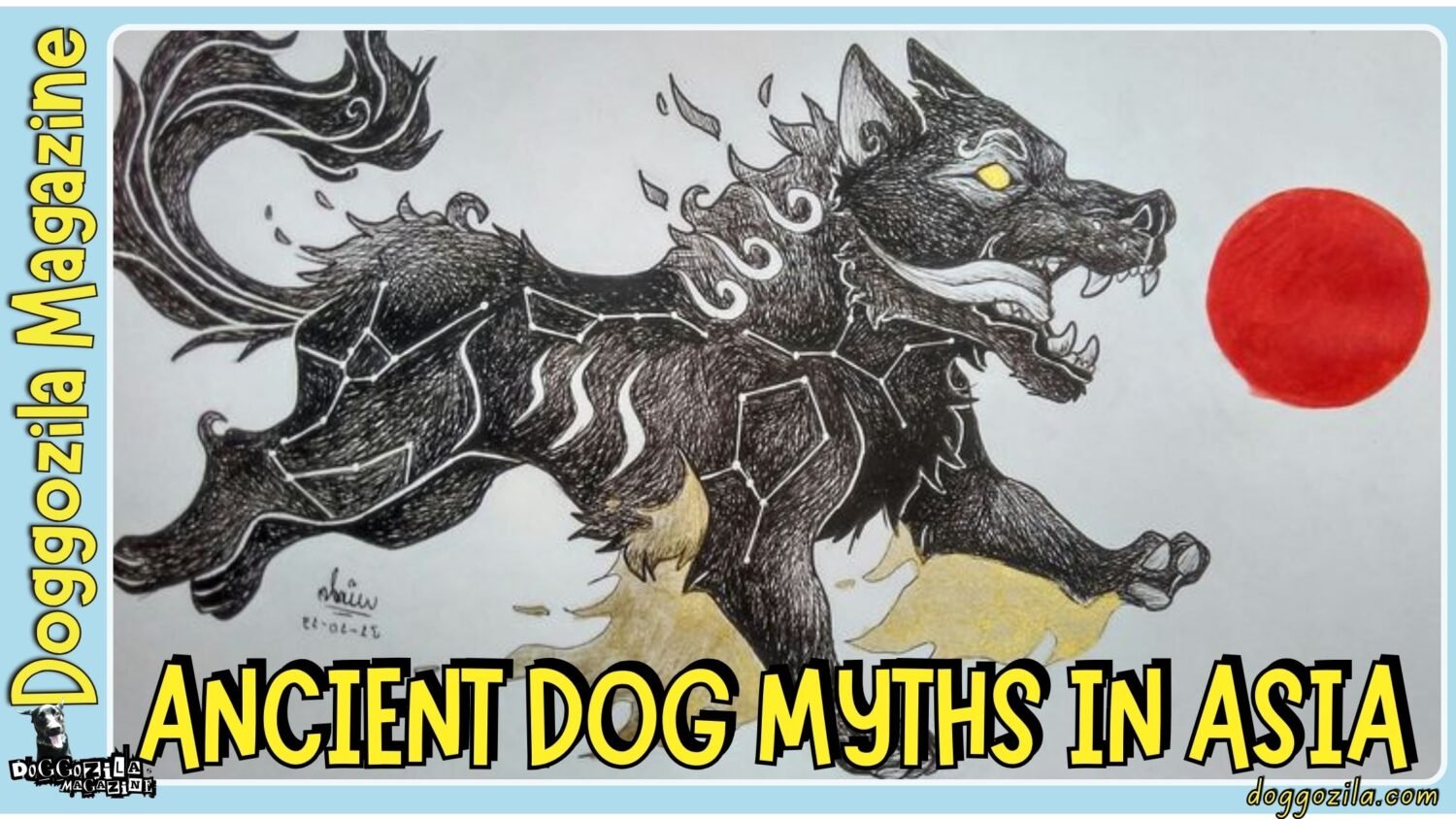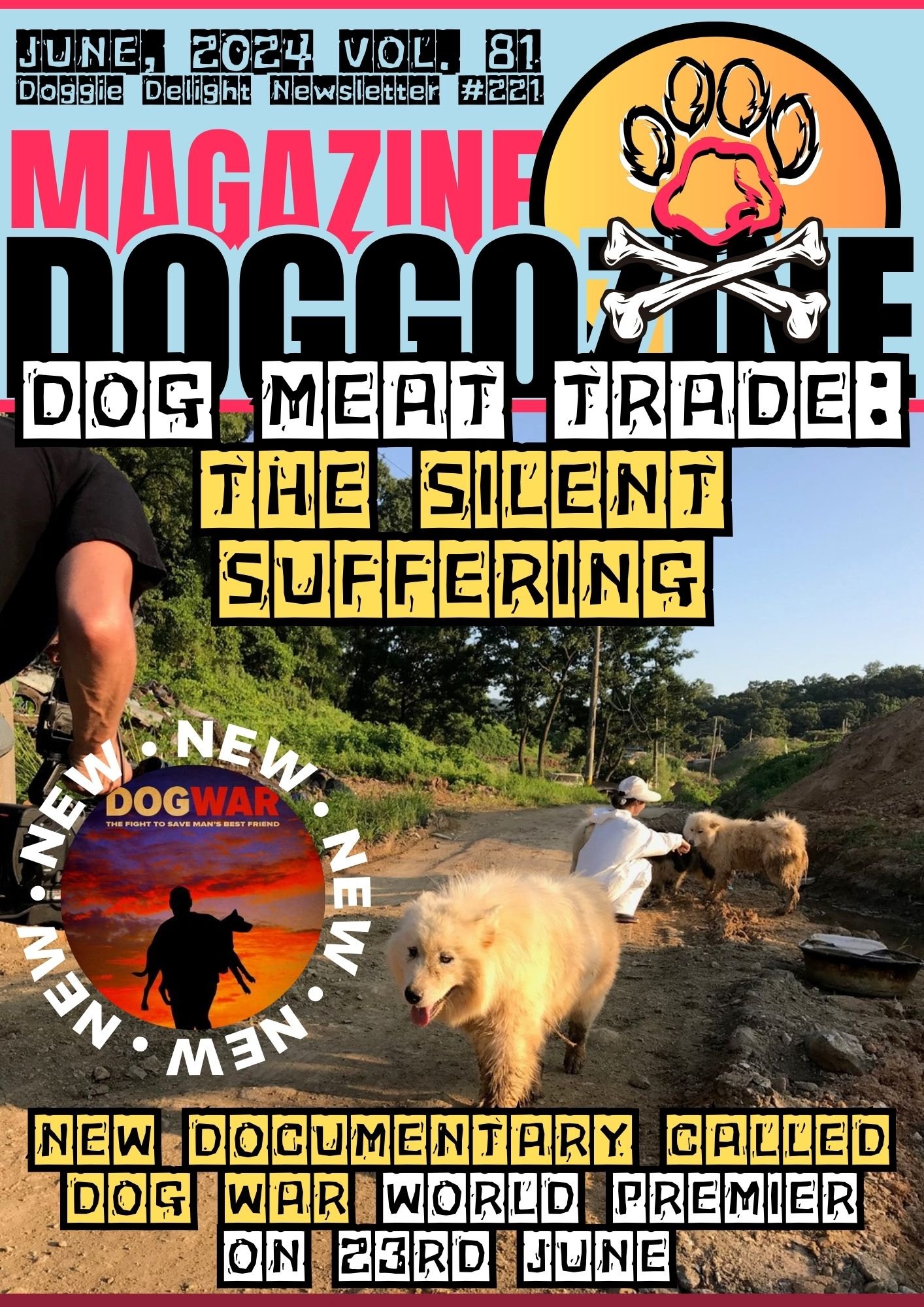
INSIDE THE SHOCKING WORLD OF THE DOG MEAT TRADE IN ASIA
Embark on a harrowing journey through Asia’s dog meat trade. It reveals the silent suffering of innocent animals. Have you ever thought about these voiceless creatures? They are crammed into tiny cages. They face unimaginable cruelty and barbaric killing methods. In this eye-opening look, we expose the dark shadows of the trade. We shed light on the industry’s massive scale, the intense animal suffering, and the shocking methods used.
As we explore this issue, we’ll confront shifting public opinions. We’ll examine the health risks posed by this trade. We’ll unravel the criminal underbelly fueling this illicit market. Join us to uncover voices of change, rescue stories, and steps you can take. Together, let’s raise awareness and ignite compassion. We can pave the way towards a more humane future.
At the end of this article we want to represent a new documentary on this topic that is coming out on 23rd June 2024, be sure to check it out!
The name of the documentary is DOG WAR
Scale of the Dog Meat Trade in Asia: A Grim Overview
The dog meat trade in Asia is a grim reality. Millions of dogs suffer brutal deaths each year. In countries like South Korea, China, Indonesia, and Vietnam, an estimated 30 million dogs are slaughtered for human consumption. This shocking number highlights the organized and unregulated nature of the industry. Dogs are stolen from homes or streets. Some are sourced from farms with appalling conditions.
They endure long-distance transport in cramped cages without food or water. They reach dog meat markets or slaughterhouses after this horrendous journey. The cruel dog meat trade in Asia is shockingly massive. In South Korea alone, approximately 2 million dogs are killed yearly. China, the biggest consumer, slaughters an estimated 10-20 million dogs annually. The Yulin Dog Meat Festival in China is notoriously cruel – thousands of dogs are consumed over 10 days.
🔑 Key Points: The unregulated dog meat industry in Asia subjects millions of dogs to extreme cruelty and suffering every year. It’s a huge, uncontrolled industry causing immense animal suffering.
The Heart-Wrenching Suffering of Dogs
Behind the numbers lies a distressing reality of animal agony. Dogs in this trade face unimaginable cruelty at every stage. They are kept in filthy, overcrowded cages, deprived of food, water, and basic veterinary care. Many suffer from injuries, diseases, and parasite infestations. The brutal transport conditions, where they are crammed into tiny cages or tied in sacks, cause further distress and harm.
At slaughterhouses, dogs face brutal handling and inhumane killing methods. They are often beaten, strangled, or boiled alive, enduring immense pain and fear in their final moments. The suffering inflicted is truly horrific and hard to comprehend.
🔑 Key Points: The suffering of dogs in the meat trade is unimaginable. They are subjected to neglect, brutality, and inhumane slaughter methods. The animals endure immense pain and distress throughout their journey.
Killing Methods: Unveiling the Brutality
The methods used to kill dogs are shockingly barbaric. In South Korea, electrocution is common – dogs are forced into cages and electrocuted with live wires. This excruciating death can take up to five minutes. In China, dogs are often beaten with metal rods or slammed against surfaces until dead. Some are even burned or skinned alive.
Dogs are often subjected to extremely brutal killing methods in China and Vietnam. They are mercilessly beaten with metal rods or clubs until dead. Some are even hanged or strangled. In a horrifying manner, conscious dogs get thrown into vats of boiling water. These cruel killing techniques are illegal in many nations. However, lack of law enforcement and unregulated trade allow these practices to continue unchecked. The brutal acts of violence against dogs go unpunished.
🔑 Key Points: The dog meat trade uses extremely inhumane killing methods. Beating, hanging, strangulation, and boiling alive are common techniques. These cause immense suffering to the animals. Yet, the practices persist due to lack of regulations and enforcement.
Shifting Public Opinion and Human Health Respects
Attitudes towards dog meat consumption are changing, especially among younger generations. Opinion polls in South Korea show 70% refuse to eat dog meat. There is growing public support for a ban on this trade. The dog meat trade also carries significant human health risks. Dogs used are often diseased, infected with rabies, cholera, parasites.
Slaughtering and eating such animals can transmit zoonotic diseases to humans. The World Health Organization warns about public health hazards linked to the dog meat trade. They urge nations to enforce stricter regulations and controls on this trade.
🔑 Key Points: Changing public opinion opposes dog meat consumption. Serious health risks arise from slaughtering and eating diseased dogs. These factors compel ending the cruel dog meat trade.
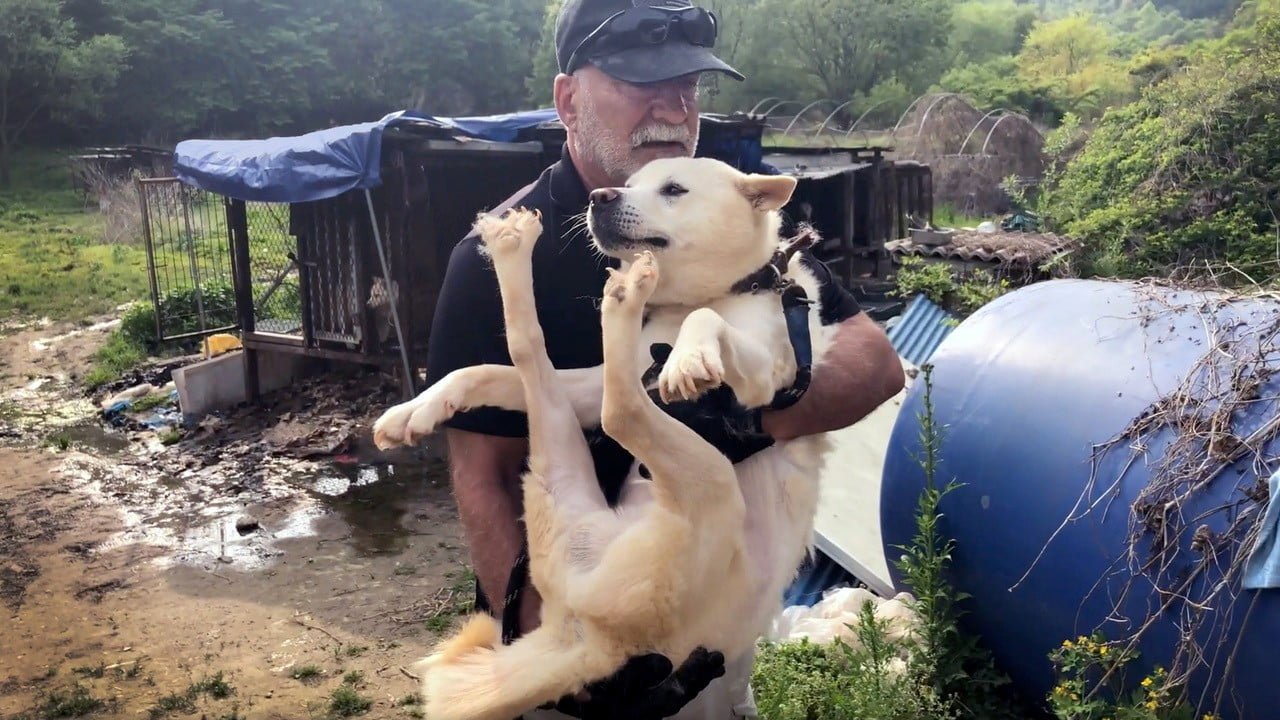
Picture from the film WAR DOG – see at the end of this article
CRIMINAL UNDERBELLY: THE ILLEGAL DOG MEAT TRADE
The dog meat trade operates through illegal activities and crimes. Many traded dogs are stolen pets, snatched from yards or streets by criminal gangs. These stolen dogs get transported across borders through vicious smuggling operations.
Criminal networks run this trade, full of illegal actions like theft and smuggling. Pet owners face trauma when beloved dogs get stolen for slaughter. Cross-border smuggling networks facilitate moving these animals across regions. The dog meat trade has a dark side. It’s tied to organized crime groups. These groups work across borders. They steal dogs and smuggle them to sell for meat. It’s hard to stop because their actions are illegal.
In China, activists have reported on these crime groups. They say corrupt officials and police let the groups work freely. Since it’s illegal, it’s difficult to control. The criminals can act without being punished. For many families, their beloved pets get stolen for meat. It’s heartbreaking. Around 70% of dogs in Bali’s meat trade are stolen pets. The owners lose their furry friends in a cruel way.
🔑 Key Points: The dog meat business has ties to crime like pet theft and animal smuggling. This makes stopping it very challenging.
Organized Crime Syndicates
The illegal dog meat trade is often run by crime syndicates. These criminal groups work across countries. They steal dogs and smuggle them over borders. Then they supply the dogs to slaughterhouses and markets that sell dog meat.
Corrupt Officials and Law Enforcement
Corruption allows the illegal trade to keep happening. Officials and law enforcement often look the other way. Sometimes they take bribes from traders. Other times they just don’t enforce laws against the illegal dog meat trade.
Stolen Pets and Shadow Trade of Dog Meat
Pet dogs get stolen for the cruel dog meat business. It’s a sad reality. Many dogs loved by families get snatched. They end up in the brutal meat trade. This shadow trade of stealing pets is very heartbreaking for owners.
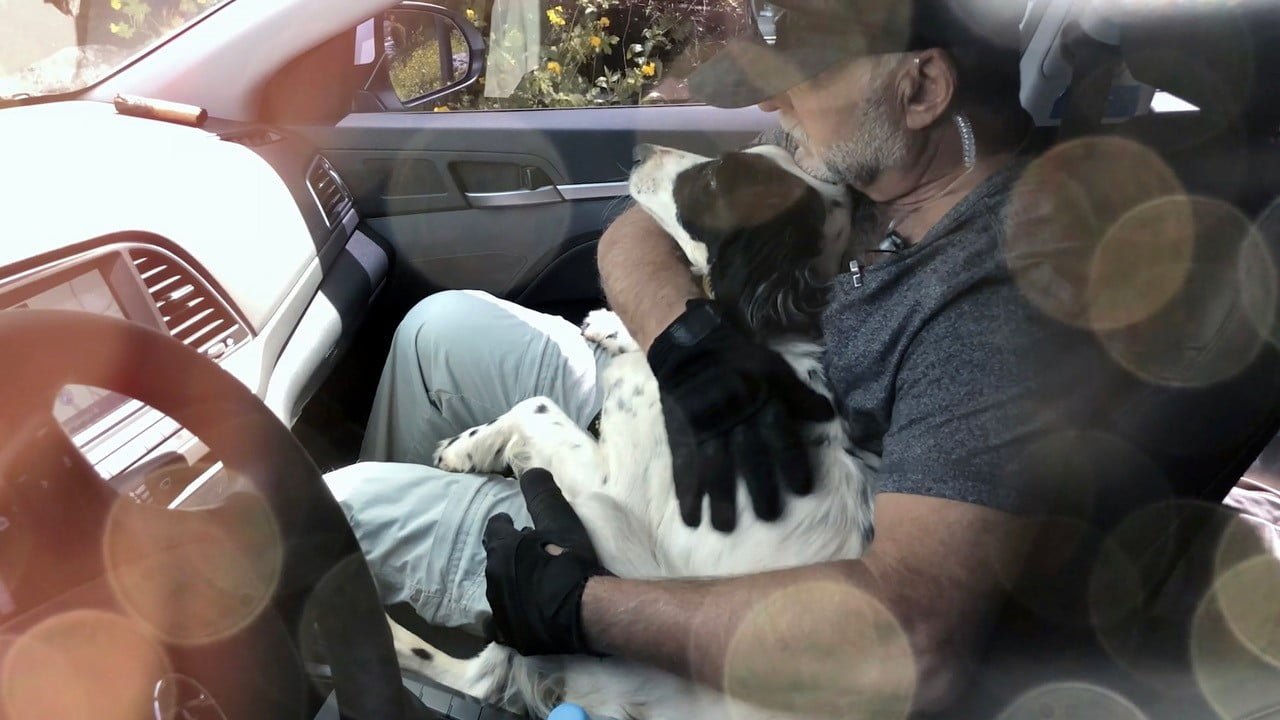
Picture from the film WAR DOG – see at the end of this article
ASIA’S COMBAT AGAINST THE DOG MEAT TRADE
Governments and authorities in Asia are increasingly taking steps to combat the dog meat trade. In South Korea, a task force has been established to crack down on illegal dog farms and slaughterhouses.
China and Indonesia have take action
China has also seen progress, with the city of Shenzhen banning the consumption of dog and cat meat in 2020. The Chinese government has signaled a potential nationwide ban on the trade in the future. Indonesia has also taken action, with the government pledging to eradicate the dog meat trade in the country. Bali, a hotspot for the trade, has seen raids on dog meat restaurants and markets.
🔑 Key Points: Governments in Asia are starting to take action against the dog meat trade, with bans, raids, and stricter enforcement of laws.
The Role of International Organizations and Activists
International animal welfare organizations and activists play a crucial role in fighting the dog meat trade. Groups like the Soi Dog Foundation and the Animal Kingdom Foundation have been at the forefront of this battle. These organizations work tirelessly to rescue dogs from slaughterhouses, provide medical care and rehabilitation, and find them loving homes.
They also conduct undercover investigations to expose the cruelty of the trade and lobby governments for stricter laws and enforcement. Activists risk their own safety to save dogs from the brutal trade. In 2011, a dedicated team from Soi Dog fought against the smuggling of 1,000 dogs from Thailand to Viet Nam, showcasing their commitment to ending this cruel industry.
🔑 Key Points: International animal welfare groups and activists are instrumental in rescuing dogs, exposing cruelty, and pushing for change in the dog meat trade.
Cultural Perspectives and Ethical Debates
The dog meat trade is often defended as a cultural practice, with proponents arguing that eating dog meat is a long-standing tradition in some Asian countries. However, this argument is increasingly being challenged on ethical grounds. Many people, both within these countries and internationally, view the dog meat trade as a cruel and inhumane practice that causes immense suffering to animals.
There is a growing recognition that culture should not be used as an excuse for animal cruelty. The debate also raises questions about the moral status of dogs and the inconsistencies in how we treat different animals. While dogs are cherished as pets in many parts of the world, other animals like pigs and chickens, which have similar cognitive abilities, are widely consumed.
🔑 Key Points: The cultural argument for the dog meat trade is being challenged on ethical grounds, with growing recognition that animal welfare should take precedence over tradition.

Picture from the film WAR DOG – see at the end of this article
VOICES OF CHANGE: STORIES OF RESCUE AND HOPE
Amidst the cruelty of the dog meat trade, there are also stories of hope and rescue. Organizations like Soi Dog have saved countless dogs from the clutches of the trade, giving them a chance at a new life.
The Story Of The Dog Fajir
One such story is that of a dog named Fajir, who was rescued from a slaughterhouse in Indonesia by Soi Dog and a journalist named John Keeble. Fajir’s rescue was featured in an investigative documentary, spreading awareness about the trade to a global audience.
The rescue of canines like Fajir brings a sense of hope and joy to animal lovers across the globe. Such stories remind us that positive change is achievable. Every dog saved from this cruel trade represents a victory against inhumanity.
Fajir’s Journey of Survival
Fajir’s rescue from a slaughterhouse in Indonesia exemplifies the life-saving efforts of animal welfare organizations. Soi Dog, collaborating with journalist John Keeble, saved Fajir from a brutal fate. This powerful story highlights the significance of intervention and advocacy.
Spreading Awareness Through Media Channels
Investigative documentaries and media coverage play a vital role in exposing the cruelty of the dog meat trade. By shedding light on heartbreaking stories like Fajir’s, these efforts raise global awareness. This increased awareness fuels public outrage and support for ending the inhumane practice.
Every Furry Life Matters
Each dog rescued from the meat trade represents a life saved from cruelty. These individual stories serve as powerful reminders. They showcase that positive change is achievable, one rescued pup at a time.
🔑 Key Points: Inspiring tales of rescue and rehabilitation offer hope in the fight against the dog meat trade. They demonstrate that change can happen, one furry friend at a time.
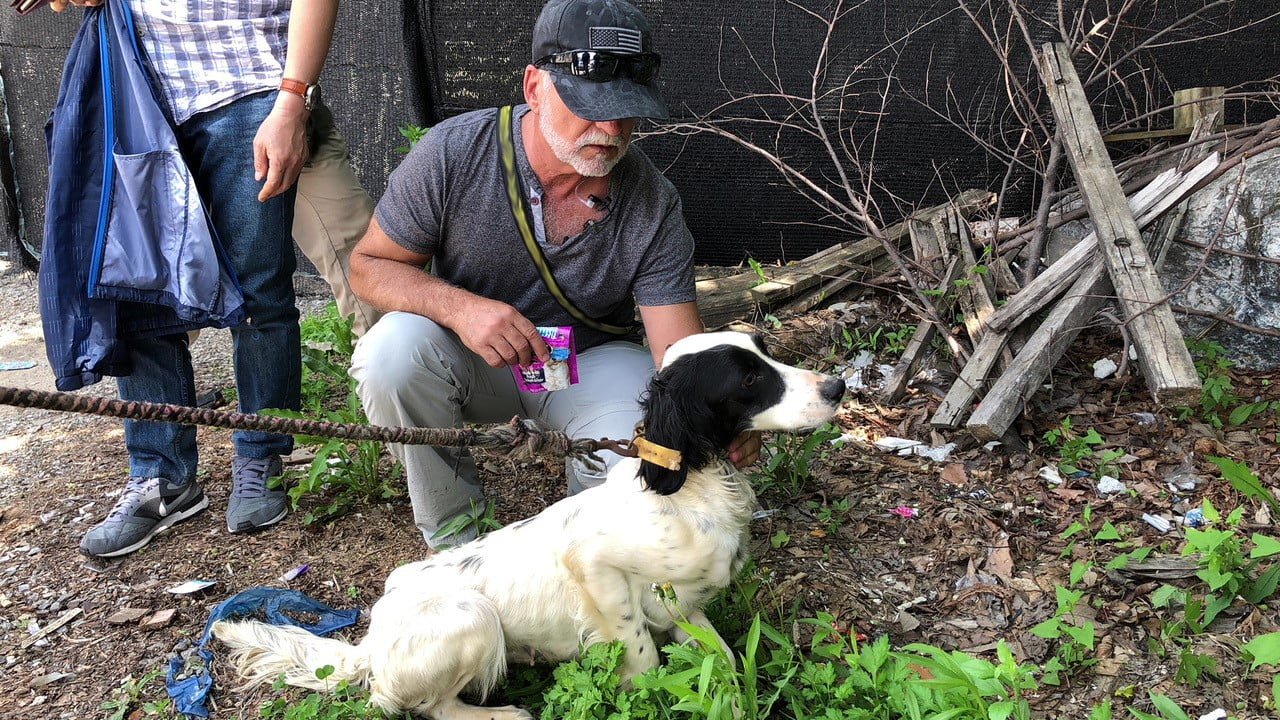
Picture from the film WAR DOG – see at the end of this article
HOW YOU CAN HELP TO STOP THE DOG MEAT TRADE
Ending the dog meat trade requires a collective effort from individuals, organizations, and governments. As an individual, there are several ways you can contribute and make a meaningful difference.
Taking Action Against The Trade of Dog Meat
You can support animal welfare organizations working to rescue dogs from the meat trade. Donating, volunteering, or spreading awareness about their efforts can significantly impact their ability to save more lives. Additionally, you can contact your local representatives and urge them to support legislation banning the dog meat trade. Raising your voice and advocating for stronger laws can help create systemic change.
Finally, educating others about the realities of the dog meat trade is crucial. Share informative resources, documentaries, and stories like Fajir’s to raise awareness. Encourage compassion and understanding among your peers, family, and community. Remember, every action counts in the fight against cruelty. By coming together and supporting organizations dedicated to this cause, we can make a lasting difference in the lives of countless dogs worldwide.
Start With These Three Steps as an Individual
- To start with, we should all try to learn more about the cruel dog meat trade. We can share facts on social media sites. We can also write emails to local leaders. And, we should support groups working to stop this practice.
- Next, be a smart buyer. Don’t buy from businesses involved in the dog meat trade. Instead, choose products that are cruelty-free. This sends a message that hurting animals is wrong.
- Third, help groups that fight on the ground for this cause. You can donate money or volunteer time. Spreading the word about their work also helps a lot.
- Finally, keep pushing governments to enforce laws against the illegal dog meat trade. Demand stronger actions to protect animal welfare. If we all speak up, we can end this cruelty.
🔑 Key Points: We can make a real difference against the dog meat trade. Educating others, buying ethically, supporting animal groups, and calling for change – these steps add up.
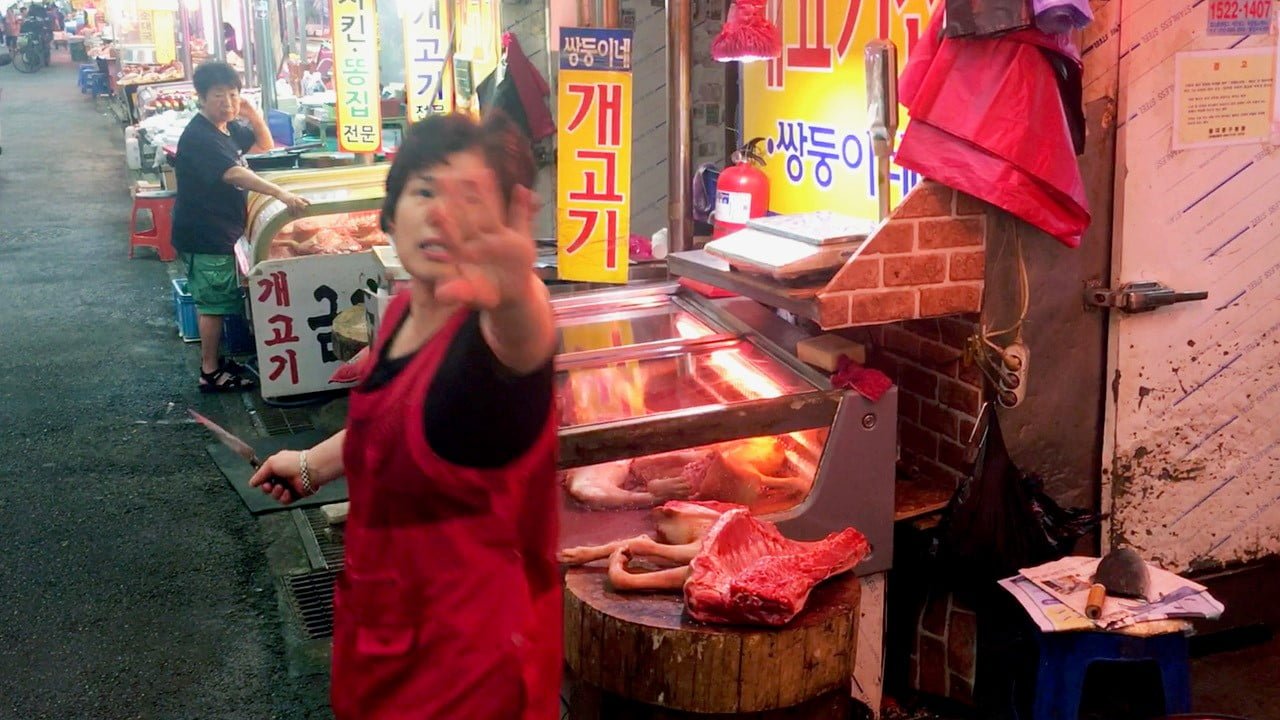
Picture from the film WAR DOG – see at the end of this article
Educate and Advocate for the Dog Meat Trade
Learning about the dog meat industry is key to fighting it. Share what you learn on social media. Talk to others about this cruel practice. Write letters to local leaders, asking them to address the issue. The more people know, the more they’ll want to help stop it.
Vote with Your Wallet
As buyers, we have real power. Simply avoid any companies involved with hurting dogs for meat. Only buy animal-friendly products instead. This reminds businesses that cruelty won’t be tolerated. Look for cruelty-free labels, and patronize places that respect animals.
Support Organizations on the Ground
Animal welfare groups fighting to stop the dog meat trade need public help. You can donate to groups like Soi Dog Foundation, Animals Asia or anyone who fight to help our furry friends. Or volunteer your time and skills. Or spread awareness about their work.
Keep the Pressure On
Governments play a key role in ending the dog meat trade. As citizens, we must keep pushing for stronger laws and better enforcement. You can write to local leaders, sign petitions, and join peaceful protests. This way, your voice gets heard. In short, this blog reveals shocking truths about the dog meat trade in Asia. It sheds light on the huge animal suffering caused by criminal groups. By exposing this brutality, it aims to spark concern for animal and human welfare.
Through rescue stories and insights from groups and activists, a glimmer of hope emerges. By understanding different views and ethics around the trade, readers can push for change. And support efforts against the illegal dog meat industry. Together, we can make a real difference for our four-legged friends. Thank you for joining this journey towards compassion.
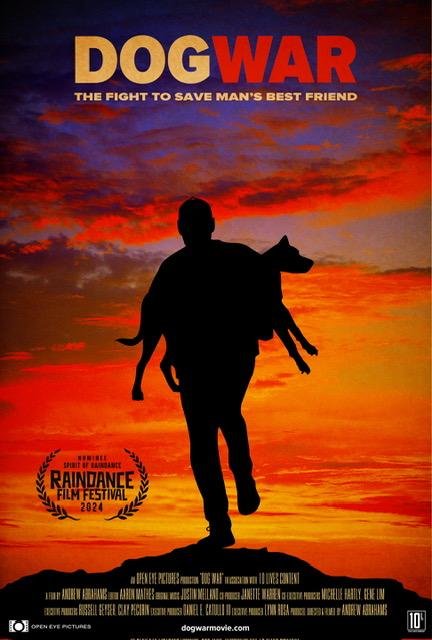
WAR DOG – World Premiere is in London this Sunday 23rd June.
DOG WAR DOCUMENTARY
There is a touching new documentary which follows a team of war-hardened, canine-loving combat veterans fighting to stop the dog meat trade in South Korea and saving dogs in the process. The film’s World Premiere is in London this Sunday 23rd June.
Film by Director Andrew Abrahams

Read what the Director of the film said:
“My films often focus on hidden stories of suffering, places where boundaries or assumptions collide, and where new life can spring forth. DOG WAR can be intense and disturbing, but avoids demonizing a people or culture — or showing the brutalization of dogs, which could turn off viewers. Rather, it gives us a window into a country in transition, asking universal questions about animal rights vs. human livelihood, heroism vs. vigilantism, and the breach of contract with man’s best friend.”
‘Dog War’ Embarks On World Premiere At Raindance Film Festival
London, UK: Thursday 6th June 2024 – Today Open Eye Pictures in association with 10 Lives Content are pleased to announce that their feature documentary DOG WAR will have its World Premiere at Raindance Film Festival on 23rd June followed by a Q&A with the director Andrew Abrahams (The Grove, Under Our Skin).
Nominated for the Spirit of Raindance Award, the film is also the top Raindance Staff Pick for “Off-Beat Docs”.Touching and action packed, DOG WAR follows a team of war-hardened, canine-loving combat veterans fighting to stop the dog meat trade in South Korea. Covertly and overtly, they infiltrate hidden farms and markets to rescue as many dogs as possible.
The film’s wide range of interviewees – activists, politicians, dog meat farmers and vendors – provide a 360-degree view of this complex issue.
DOG WAR is not just about dogs, but the clash of perspectives about what is right, ethical, and even natural or cultural. While spotlighting a country at war with itself over the issue, the film also ignites questions about cultural difference and social change.
Film Credits
An OPEN EYE PICTURES Production in Association with 10 LIVES CONTENT
Directed & produced by ANDREW ABRAHAMS
Editor AARON MATHES
Music Composer JUSTIN MELLAND
Director of Photography ANDREW ABRAHAMS
Executive Producer DANIEL E. CATULLO, LYNN ROSA, CLAY PECORIN, RUSSELL GEYSER
Dog Meat Trade Statistics
The dog meat trade is most widespread in China, South Korea, the Philippines, Thailand, Laos, Viet Nam, Cambodia, Indonesia and Nagaland in northern India. This trade is well-organized, with high numbers of dogs being stolen or taken from the streets, transported over long distances and brutally slaughtered.
In South Korea, dogs are also intensively farmed for the meat trade. Dogs are also known to be eaten in certain African countries such as Ghana, Cameroon, DRC and Nigeria, and there are reports that dogs are killed for personal consumption by some farmers in remote parts of Switzerland, but nothing compares to the sheer scale of the trade across Asia. (Humane Society International)
World Premiere:
Sunday 23rd June, 2024 – 2.55pm, Prince Charles Cinema
CLICK THIS LINK TO WATCH TRAILER










